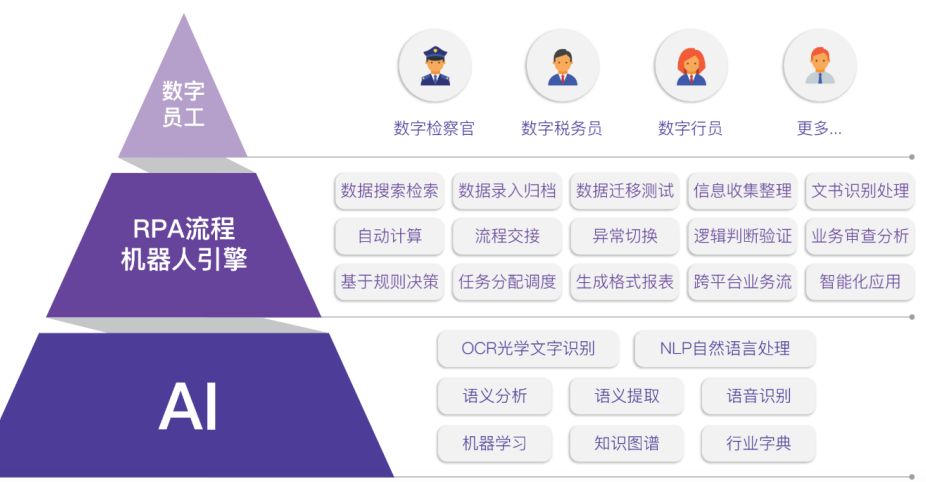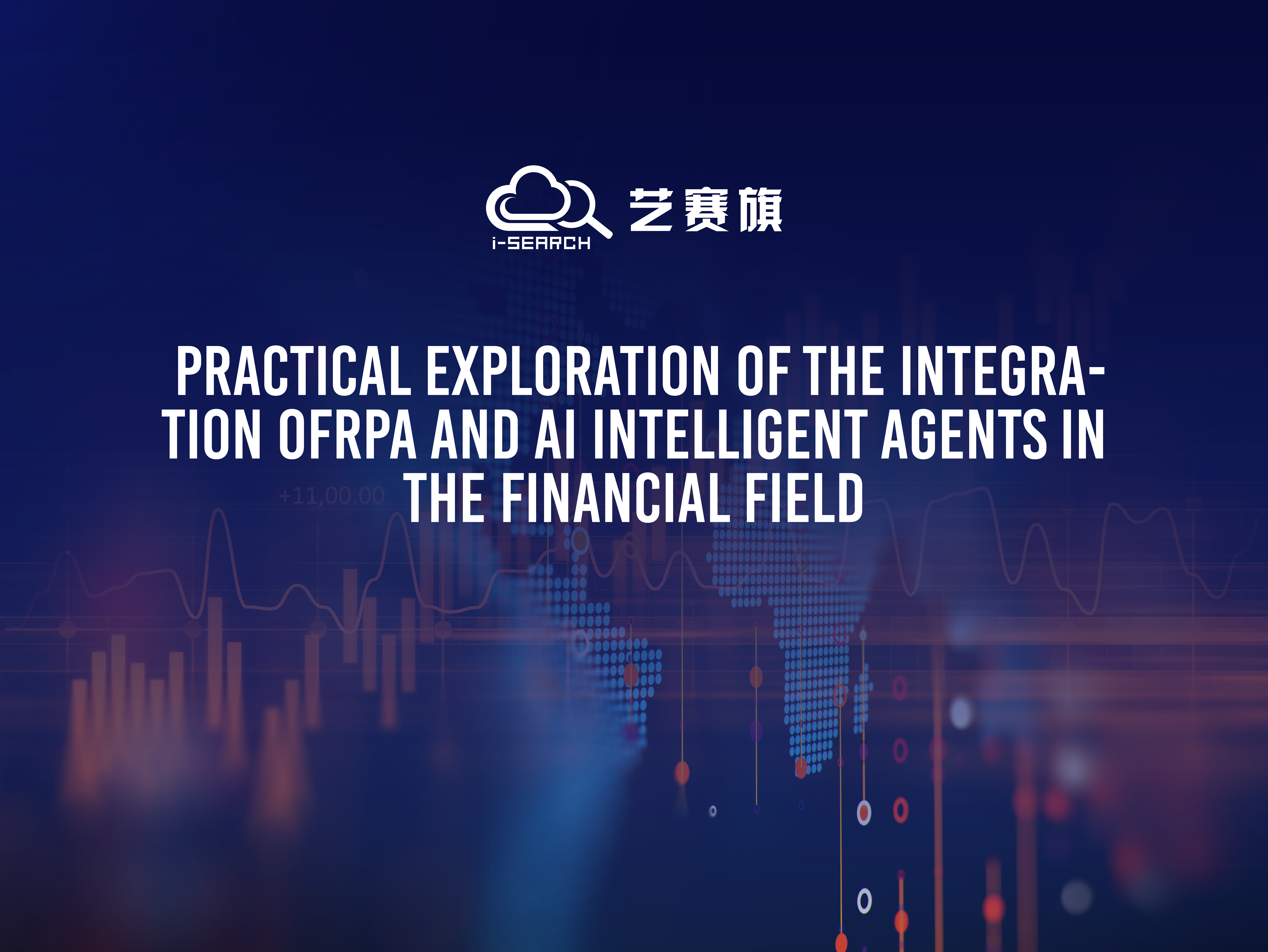The current intelligent finance field has successfully applied technologies such as RPA, neural networks, and knowledge graphs, establishing a solid foundation for automation. As a new generation of technological paradigm, AI agents bring stronger functional expansion to intelligent financial systems through their autonomous perception, dynamic decision-making, and collaborative execution capabilities. This technology can deeply integrate existing solutions, maintaining the original technological advantages while providing more flexible and intelligent support for complex business scenarios, real-time dynamic decision-making, and multi-party collaboration processes.
The introduction of AI agents has significantly improved the financial system in terms of data processing efficiency, scenario adaptability, and collaborative intelligence, opening up broader possibilities for the digital transformation of finance.
The integration of RPA and AI intelligent agent technology is essentially a complementary combination of rule driven and data-driven approaches, forming synergistic effects in multiple dimensions such as execution and decision-making, certainty and uncertainty, efficiency and intelligence. AI agents will inject intelligent processing capabilities into RPA, enabling it to break through traditional rule limitations and cope with complex and ever-changing financial scenarios; RPA provides efficient execution channels for AI agents to achieve automated implementation of intelligent decision-making
1.RPA+AI intelligent agents bring innovation to financial work
-
Vertical integration of technology stackFront end interaction layer RPA+Back end decision layer AI intelligent agentRPA is responsible for data collection and execution (such as logging into the system to export reports), while AI agents perform semantic parsing and strategy generation (such as identifying risk indicators from reports and generating response plans). For example, banks can use RPA to capture customer transaction data, and then have AI agents analyze abnormal patterns and trigger anti fraud processes.
-
Dynamic process optimization
AI intelligent agents empower RPA to quickly respond to changes in demandFor example, in the month end closing process, employees can input "add a provision for expense carryover starting next month" in natural language according to work needs, and the AI agent will automatically update the RPA rules after understanding.
-
Advanced mode of human-machine collaborationRPA undertakes repetitive operations, AI agents empower human decision-makingIn financial analysis, RPA automatically generates basic reports, while AI agents generate deep insights (such as industry trend benchmarking and risk warning) by correlating external market data to assist financial personnel in formulating strategies.
At various critical stages of the financial process, AI agents have demonstrated unique application value.
-
Financial data processing and input processIn the process of financial data processing and input, the accuracy and timeliness of data are crucial. Many enterprises have adopted AI based automated data collection and input systems. These systems can automatically extract financial data from various data sources, such as enterprise business systems, electronic invoices, bank statements, etc., and organize and input it according to preset rules and formats.Taking revenue recognition and measurement as an example, according to the new revenue standards, when financial personnel need to create revenue documents, they often need to check contracts, approval forms, etc. Whether the contract meets the corresponding internal control requirements (such as whether the double seal is complete) currently requires personnel to complete it, because the contract formats are diverse. At this point, AI contract agents can be used to extract contract texts with different formats into structured data through analysis of large language models, such as checking whether both parties have stamped, obtaining installment payment amounts, tax information, counterparty names, payment bank account information, etc. Transfer structured information to RPA for further processing, and drive the flow of revenue documents to the next stage (such as invoicing) in the ERP system. When RPA is combined with AI agents, it expands the application boundaries of RPA and breaks through people's fixed understanding of RPA rules.
-
Tax management processIn the tax management process, especially in cross-border taxation, complex international tax laws, exchange rate fluctuations, and multi country financial data need to be handled. Intelligent agents can use NLP technology and machine learning algorithms to understand complex tax rules, timely pay attention to changes in financial and tax policies of various countries, obtain tariff related information, and then use RPA to complete the filling and inspection of tax information.

3.The challenges and responses of enterprises introducing AI intelligent agents
Although the combination of finance and AI intelligent agents brings many advantages, enterprises also face some challenges in the introduction process.
Although the combination of finance and AI intelligent agents brings many advantages, enterprises also face some challenges in the introduction process.
- Data security and privacy protection are the primary issues. Financial data involves core business secrets of enterprises, and once leaked, it will cause huge losses to the enterprise. Enterprises need to establish a strict data security management system, use encryption technology to encrypt storage and transmission of financial data, set up strict user permission management, and ensure that only authorized personnel can access and process relevant data. At the same time, it is necessary to strengthen the security protection of AI intelligent agent systems, regularly conduct security vulnerability detection and repair, and prevent hacker attacks and data leakage incidents from occurring.
- The compatibility between technology and talent is also a major challenge. The technology of AI intelligent agents is relatively complex, and enterprises need to have composite talents who understand both financial business and AI technology to promote the implementation and application of the system. However, there is currently a shortage of such versatile talents. On the one hand, enterprises can strengthen internal training and provide AI technology related training courses for financial personnel to enhance their technical application capabilities; On the other hand, external professional talents can be actively introduced to enrich the technical team of the enterprise. In addition, when choosing AI intelligent agent products, full consideration should be given to the usability and scalability of the products, ensuring seamless integration with the existing financial systems and business processes of the enterprise, and reducing the difficulty of technical implementation.
The combination of RPA and AI intelligent agents has become an inevitable trend in the development of the financial field. Through practical application in various aspects such as financial accounting, analysis, data processing, reimbursement, and tax management, AI intelligent agents have significantly improved the efficiency, accuracy, and decision support level of financial work. Despite facing challenges such as data security, technology and talent adaptation, as long as enterprises take proactive and effective measures to respond, they can fully leverage the advantages of AI intelligent agents, promote the digital and intelligent transformation and upgrading of financial management, and provide strong support for the sustainable development of enterprises. In the future, with the continuous innovation and development of AI technology, the integration of finance and AI intelligent agents will become deeper, bringing more innovative applications and development opportunities to the finance industry.

 企业平台
企业平台 发现评估
发现评估 自动化
自动化 行业解决方案
行业解决方案 业务解决方案
业务解决方案 合作伙伴
合作伙伴 生态联盟
生态联盟 咨询服务
咨询服务 培训服务
培训服务 交流社区
交流社区 客户成功
客户成功 产品文档
产品文档
 公司介绍
公司介绍 新闻列表
新闻列表 联系我们
联系我们 加入我们
加入我们

